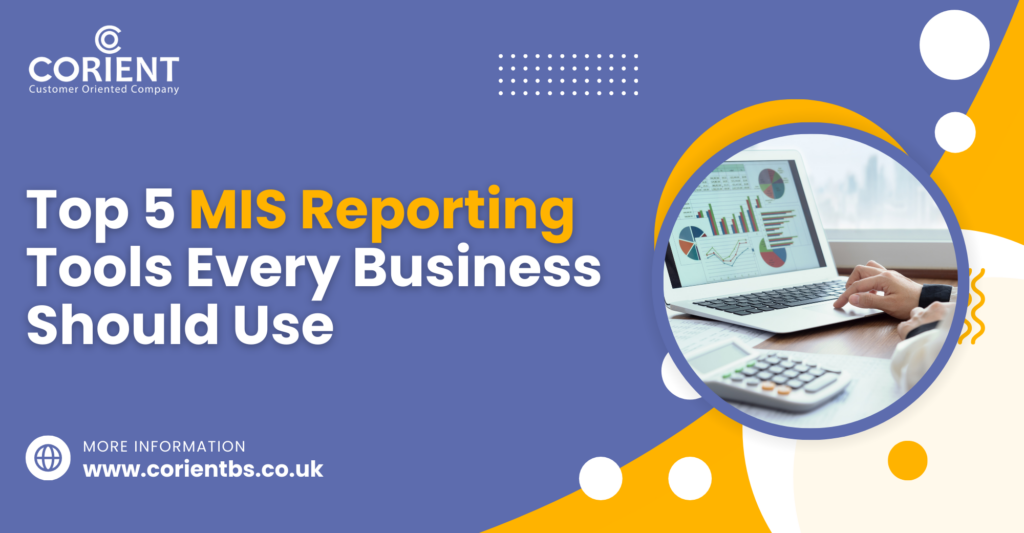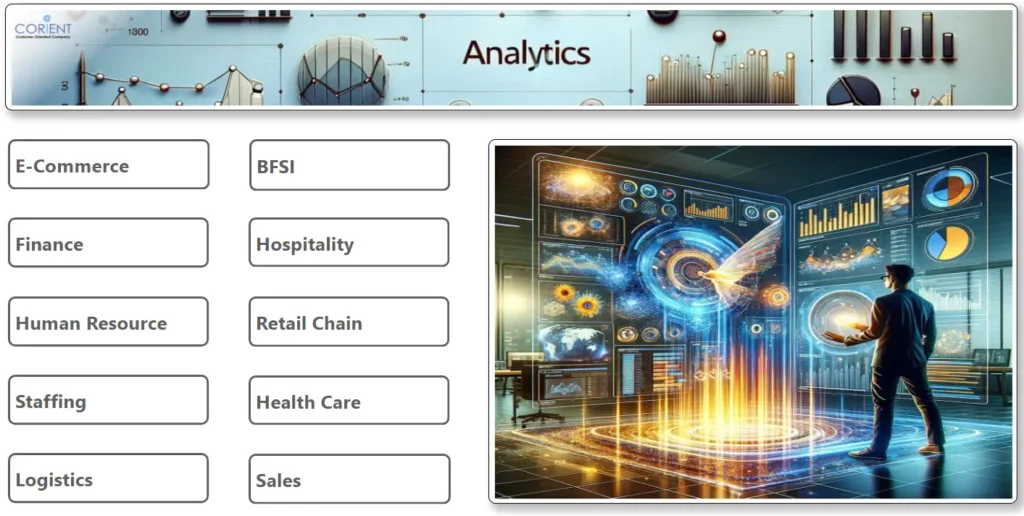
Top 5 MIS Reporting Tools Every Business Should Use
What are MIS Reporting Tools?
The main purpose of MIS reporting tools is to help you gather and organise data from multiple sources. The collected data is then structured, compiled, and arranged in tables or charts so that it looks visually attractive. By adopting this method, you will be able to understand the information much more easily, and informed decisions can be made. Also, this information can be easily shared with the stakeholders and understood by them.
It is safe to say that MIS reporting tools enable you to gather accurate information as quickly as possible for making quick and informed decisions because, as time passes, the value of the information decreases. These tools are used by your competitors for streamlining purposes. Those who cannot get these tools can avail themselves of its services through accounts outsourcing service providers such as Corient Business Solutions.
Types of MIS Reporting Tools and Software
Currently, there are a wide variety of MIS reporting tools in various software applications that help generate innovative reports that will help make informed business decisions. These tools, if used properly, can increase your capacity to manage information. Let’s get into the types of MIS reporting tools that are available:
Data Visualisation Tools
The main goal of data visualisation tools is to make the data visually appealing and easy to understand. To achieve that, it uses graphs, charts, and interactive dashboards, thus allowing stakeholders to understand complex insights easily. By using such tools, you can simplify complex data and communicate effectively.
These tools have multiple other benefits, such as promoting effective communication, promoting data-based decision-making, and facilitating data understanding. These types of tools enable valuable insights, thus increasing productivity and capacity to make strategic decisions.
Business Tools
Business Intelligence or BI tools play an important role in MIS reporting. It helps in extracting data from multiple systems and databases and then it is transformed into useful reports, charts, and graphs for easy understanding.
Dashboard Tools
Dashboard tools play an essential role in MIS reporting by providing a detailed and visual representation of data. They achieve that by transforming data into interactive dashboards which showcase important metrics and performance indicators. These dashboard tools are designed to be user-friendly and allow you to monitor trends, check for patterns, and get key insights.
Reporting and Analytic Tools
Using these tools, you can generate important reports for your clients without any difficulty, which is useful when handling large data sets. These tools also give you real-time access to your client’s business performance and identify areas for improvement. Also, these tools offer the option to customise reports and dashboards to meet your client’s requirements and satisfy stakeholder’s needs.
Furthermore, these tools offer advanced functions such as forecasting, data modelling, and predictive analytics. These functions can make your clients future-ready, reduce risks, and exploit opportunities.
Overviews of the Best Business and Reporting Tools
Google Analytics

Google Analytics stands out as one of the leading, free-of-cost reporting tools available in the market. It captures data using Google Analytics tracking code and sends it to Google servers using various parameters.
Looker Studio

Previously known as Google Data Studio, the Looker Studio tool can establish connectors that will collect and compare data, make reports, and tailor dashboards as your clients prefer using drag-and-drop features.
OWOX BI

OWOX BI is an analytics platform that collects vast amounts of raw data from online and offline sources in one place. It also helps monitor data quality and supports UTM parameters.
Funnel

Funnel is a data analytics platform that collects data and organises it properly so that it is ready for use in reports, interactive dashboards, and key metrics.
Power BI

Microsoft Power BI is a business intelligence software and analytics tool that is used for automating report making. It works by collecting data and build interactive reports and dashboards based on it. It is also very convenient to use because of its similarities with other Microsoft products.
One major advantage of Power BI is its integration capacity, with over 120 free connectors, making it popular among report-making tools. Furthermore, Power BI is widely used among accounting firms and service providers like Corient Business Solutions through Power BI Consulting & Development Services.
What are the Benefits of Data Analysis Reporting Tools?
With the help of MIS reporting tools, you can offer multiple benefits to your clients, thus helping them improve their decision-making and efficiency. Some of these benefits are as follows:
Real-Time Insights
With their real-time insights and analysis, MIS reporting tools can help your clients monitor their performances, recognise trends, and take action to correct a mistake or take advantage of opportunities.
Enhance Data Visualisations
With the help of data visualisations, the MIS tools can simplify complex using dashboards, tables, graphs, and colours.
Increase in Efficiency
MIS reporting tools automate the reporting process, thus reducing the time spent collecting data and the costs involved in manual report-making. Thanks to these tools, you can free up your resources for other important tasks. These tools also ensure consistency in formats and templates, thus reducing human errors and discrepancies.
Consistency and Accuracy
The foundation of reporting depends on the accuracy of data; without it, reports generated will be inaccurate, leading to a loss of faith among your clients. MIS reporting tools maintain that accuracy through proper security measures. Through data encryption, controlled access data security is maintained by these tools. The accurate reports generated are then used by your clients for getting business loans and for HMRC submissions.
Flexibility and Adaptability
Finally, MIS reporting tools are quite flexible in adjusting according to your client’s business requirements. They can easily integrate with your client’s databases and systems, thus ensuring uninterrupted data flow and facilitating informed decision-making across departments.
Important Lessons for Selecting the Best Reporting Software
While selecting a MIS reporting tool for your client, make sure you consider certain important factors, which are as follows:
- Firstly, understand your client’s requirements, i.e., its specific needs and goals. This way, you can look for features in the required tools.
- After you have understood your client’s requirements, it is important to know about the MIS reporting tools available in the market. These tools come with various capabilities and features, such as different interfaces and integration capabilities. Through research, you can identify these features and make informed decisions.
- Compare these tools with their features, ease of use, scalability, and integration with other systems. Also, ensure your clients can determine which of these tools meets their requirements.
- Lastly, once you select an MIS reporting tool, set it up and integrate it with your client’s databases and systems. Configure the tool to meet your client’s reporting requirements. Also, training must be provided to your client and its employees so that there is smooth adoption.
Conclusion
We hope this blog has clarified the benefits of MIS reporting tools and their impact on report-making efficiency and quality. With clients demanding ever more accurate and insightful reports within a short period of time, MIS reporting tools have gained even more importance. By following the above-listed points, you will be able to select the best MIS reporting tool for your client.
However, if you are unable to handle these tools efficiently, you can outsource the task of report-making to an accounts outsourcing service provider that uses MIS reporting tools. That’s where Corient Business Solutions comes into the picture.
Apart from offering report-making and analytical services through our Power BI Consulting and Development Services, we also offer payroll, bookkeeping, management accounts, year-end, and VAT services. We would like to set up an online meeting at your convenience so that we can understand your requirements and explain our services in detail.

